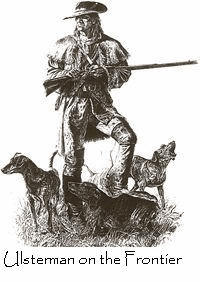Posted at The Reformation/ Ulster Scots Index:
Originally published by the Scottish Section of "America's Making" New York, 1921, p 8 -18. Some additional cross references have been added in [ ] and as footnotes.
Parker, the historian of Londonderry, New Hampshire, speaking of the early Scots settlers in New England, has well said: "Although they came to this land from Ireland, where their ancestors had a century before planted themselves, yet they retained unmixed the national Scotch character. Nothing sooner offended them than to be called Irish. Their antipathy to this appellation had its origin in the hostility then existing in Ireland between the Celtic race, the native Irish, and the English and Scotch colonists. Belknap, in his History of New Hampshire (Boston, 1791) quotes a letter from the Rev. James MacGregor (1677-1729) to Governor Shute in which the writer says: "We are surprised to hear ourselves termed Irish people, when we so frequently ventured our all for the British Crown and liberties against the Irish papists, and gave all tests, of our loyalty, which the government of Ireland required, and are always ready to do the same when demanded."
Down to the present day the descendants of these Ulster Scots settlers living in the United States who have maintained an interest in their origin, always insist that they are of Scottish and not of Irish origin. On this point it will be sufficient to quote the late Hon. Leonard Allison Morrison, of New Hampshire. Writing twenty-five years ago he said: "I am one of Scotch-Irish blood and my ancestor came with Rev. McGregor of Londonderry, and neither they nor any of their descendants were willing to be called 'merely Irish.' I have twice visited," he adds, "the parish of Aghadowney, Co. Londonderry, from which they came, in Ireland, and all that locality is filled, not with 'Irish' but with Scotch-Irish, and this is pure Scotch blood to-day, after more than 200 years." The mountaineers of Tennessee and Kentucky are largely the descendants of these same Ulster Scots, and their origin is conclusively shown by the phrase used by mothers to their unruly children:
Originally published by the Scottish Section of "America's Making" New York, 1921, p 8 -18. Some additional cross references have been added in [ ] and as footnotes.
 |
| Image from GoFoxburg.com |
Down to the present day the descendants of these Ulster Scots settlers living in the United States who have maintained an interest in their origin, always insist that they are of Scottish and not of Irish origin. On this point it will be sufficient to quote the late Hon. Leonard Allison Morrison, of New Hampshire. Writing twenty-five years ago he said: "I am one of Scotch-Irish blood and my ancestor came with Rev. McGregor of Londonderry, and neither they nor any of their descendants were willing to be called 'merely Irish.' I have twice visited," he adds, "the parish of Aghadowney, Co. Londonderry, from which they came, in Ireland, and all that locality is filled, not with 'Irish' but with Scotch-Irish, and this is pure Scotch blood to-day, after more than 200 years." The mountaineers of Tennessee and Kentucky are largely the descendants of these same Ulster Scots, and their origin is conclusively shown by the phrase used by mothers to their unruly children:
"If you don't behave, Clavers [i.e.,Claverhouse] will get you."[1]If we must continue to use the hyphen when referring to these early immigrants it is preferable to use the term "Ulster Scot" instead of "Scotch-Irish," as was pointed out by the late Whitelaw Reid, because it does not confuse the race with the accident of birth, and because the people preferred it themselves. "If these Scottish and Presbyterian colonists," he says, "must be called Irish because they had been one or two generations in the north of Ireland, then the Pilgrim Fathers, who had been one generation or more in Holland, must by the same reasoning be called Dutch or at the very least English Dutch."